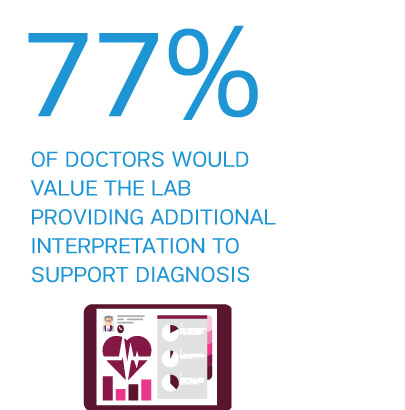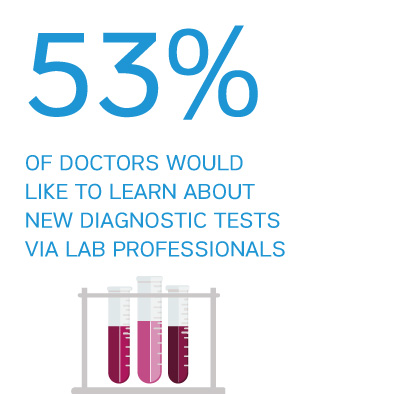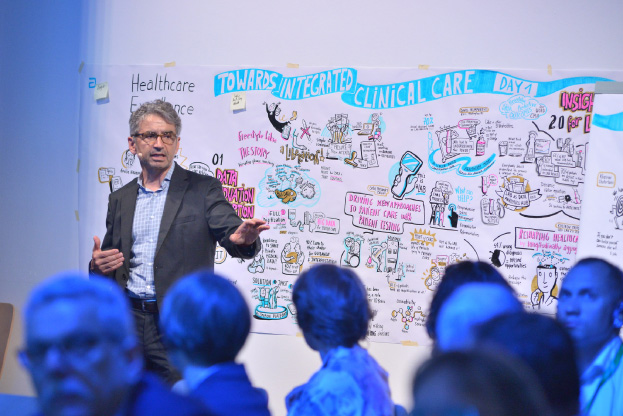Leadership challenges for NHS consolidation
Saghar Missaghian-Cully
Managing Director,
Northwest London Pathology,
London, UK
Dimitris Chatzidimitriou
Founder & Lab Director,
Labnet, Greece
Alexander Hoffman
(Abbott Diagnostics)
on behalf of Peter Thorausch
Head of Laboratory,
Limbach Group,
Cottbus, Germany
Like many markets, the demand for healthcare services in the UK is constantly increasing, without an equivalent growth in government spending to pay for it. Consolidation of pathology services is considered an essential element of reducing overheads, and an ambitious project to reorganize laboratory services into 29 pathology networks recently began. Using a 'hub and spoke' model – with shared administrative and management services – will reduce overheads and allow better use of staff resources, as well as improving access to specialist testing. The resulting increase in collaboration and cooperation will also help to ensure that advances in medical understanding and clinical practices are spread more rapidly, leading to improved outcomes, better demand management and reduced turnaround times. To realize these aims, it is important to engage all stakeholders at an early stage of the consolidation process, agreeing 'pragmatic' principles and goals and that can realistically be achieved, then working together to update processes to optimize results. Monitoring and measuring ongoing performance is crucial, helping to create a sustainable business model that reduces operational risks and helps to deliver better overall care. Saghar Missaghian-Cully

Opportunities and collaborations across the Greek diagnostics network
The pathology sector in Greece is highly fragmented, with hospital labs only serving their own patients, and many small labs only offering localized testing for a limited range of assays. This has created a 'gap' in the market for private patients and advanced diagnostics, which is currently served by a few core commercial reference labs. There is no doubt that good quality pathology services – in terms of both testing and guidance on results – can result in earlier diagnosis, better treatment and more targeted therapies, but it is becoming increasingly difficult for labs to maintain this quality without becoming uncompetitive in an open market. To achieve this, labs need to focus on innovation and offering a 'value added' service, which involves investing in the right staff and training, and working with trusted and reliable partners. In an environment of ever-shrinking margins, we must constantly adapt, improve and innovate to move ahead, and staying focused on quality is essential to long-term success. Dimitris Chatzidimitriou

A role for clinical decision support in Germany
Rapid developments in medical understanding lead to constant changes in clinical best practice, making it virtually impossible for doctors to keep up-to-date on the latest guidelines and recommendations. Clinical decision support (CDS) systems – such as AlinIQ CDS – help to guide treatment decisions and improve overall patient care by allowing the collective medical expertise within an institution to be captured, digitized and combined with information from other sources to create treatment pathways that can be applied in a standardized, scalable and safe way. This supports improved clinical decision-making and more effective care, helping to ensure better outcomes and improving operational efficiency. Implementation of a CDS system can provide benefits across the entire healthcare continuum, but requires close partnership between the lab, the CDS provider and clinical staff to develop a system that improves patient care and helps healthcare providers to achieve their strategic and management goals. Setting clear and measurable targets for CDS implementation will provide strong evidence to demonstrate the potential for both downstream savings and improved patient care, helping to further demonstrate the central role the laboratory plays in patient management. Alexander Hoffmann.











![Tuberculosis Diagnostics: The Promise of [18F]FDT PET Imaging Tuberculosis Diagnostics: The Promise of [18F]FDT PET Imaging](https://res.cloudinary.com/healthmanagement-org/image/upload/c_thumb,f_auto,fl_lossy,h_184,q_90,w_500/v1721132076/cw/00127782_cw_image_wi_88cc5f34b1423cec414436d2748b40ce.webp)



